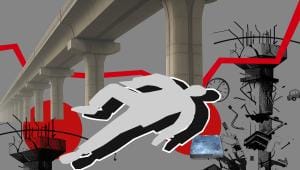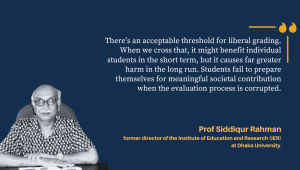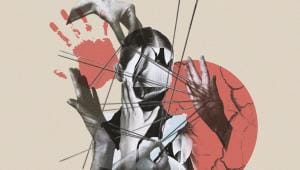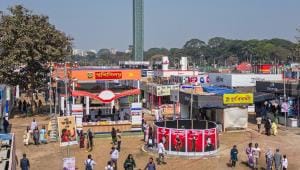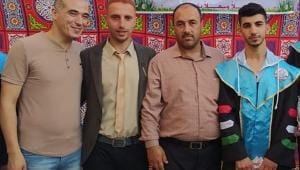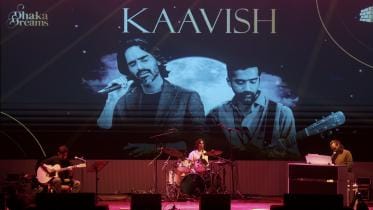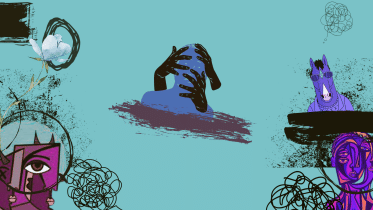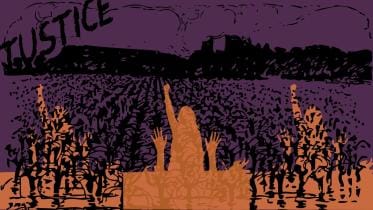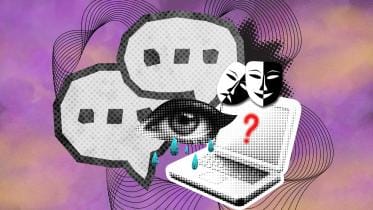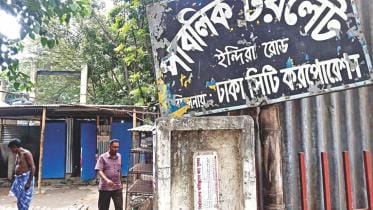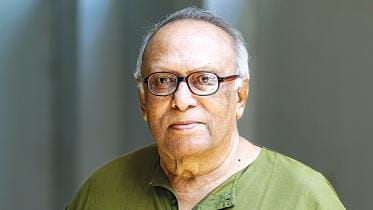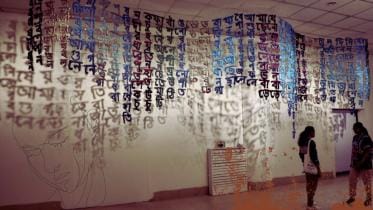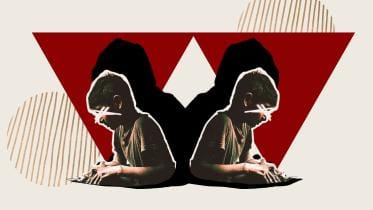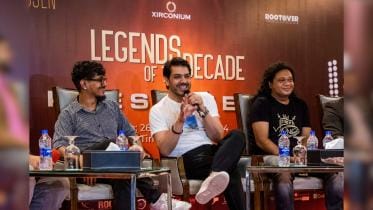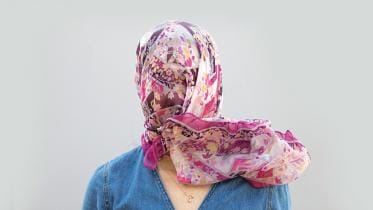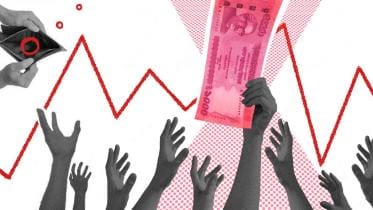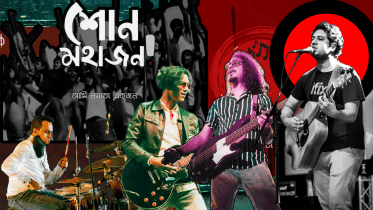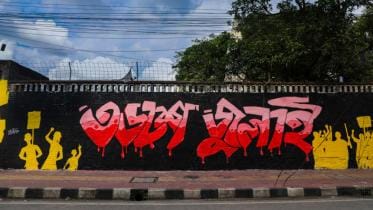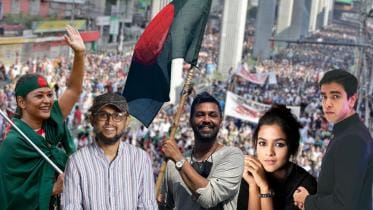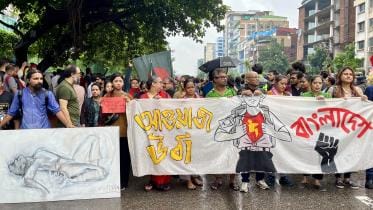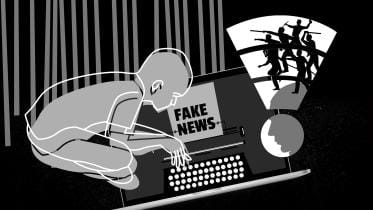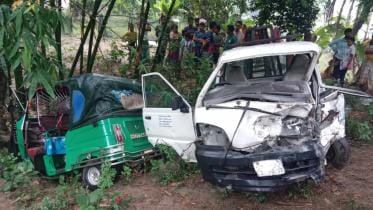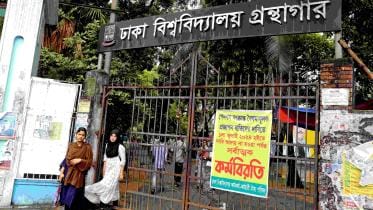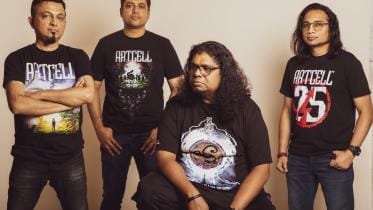Living and breathing ‘Dhaka Dreams’ with Kaavish
The excitement had been building for weeks, and when Kaavish finally took the stage for “Dhaka Dreams” yesterday at Senaprangan, the atmosphere was nothing less than incredible. Blue Brick Communications, the organiser with a track record of successful events like "Dhaka Melancholy" featuring Indian singer Nachiketa Chakraborty and "Dhaka Retro" with James, found themselves navigating a challenging evening that tested the limits of concert organisation.
25 January 2025, 13:51 PM
A crossover episode with my depression
Mental health struggles are part of the journey, not character flaws or personal failures.
10 January 2025, 04:00 AM
Hosts bedazzle in Safiya Sathi outfits
When Bangladesh’s glitterati descended upon this year’s Blender’s Choice-The Daily Star OTT & Digital Content Awards, they brought with them an air of sophistication that could rival any international red carpet. Behind the scenes, pulling the strings of this sartorial symphony was none other than Safiya Sathi, whose design house returned as the event’s costume partner for the second consecutive year.
29 December 2024, 18:00 PM
Dismantling rural gender-based violence requires more than awareness
In rural areas, gender-based violence traps women in a cycle of abuse, fear, and systemic neglect.
4 December 2024, 06:00 AM
When digital space becomes a paradise for harassers
In the era of technology, gender-based violence too has taken a new form in the digital space in Bangladesh.
29 November 2024, 02:15 AM
Clean toilets: A ‘luxury’ Dhaka’s vulnerable cannot afford
Dhaka's claims to metropolitan status will remain incomplete while women bear the brunt of insufficient hygienic public toilets.
19 November 2024, 09:00 AM
A thespian's final bow
Masud Ali Khan, a towering figure in Bangladeshi performing arts, passed away yesterday at his home in the capital’s Green Road, leaving behind a remarkable legacy that spans over seven decades of unparalleled artistic brilliance.
31 October 2024, 18:21 PM
Shilpakala Academy’s catalytic role against polarisation and extremism
BSA's initiatives in theatre, music, and visual arts have proven to be effective tools for bridging divides in Bangladesh's politically charged environment. The academy's diverse programming speaks to a wide range of Bangladeshis, although often failing to transcend party affiliations and ideological differences.
27 October 2024, 18:05 PM
Confronting the overlooked facets of child abuse
Child-on-child sexual abuse is a subset of the broader child sexual abuse epidemic that plagues Bangladesh.
17 October 2024, 10:30 AM
An evening with Jal: Of nostalgia, music, and reunion
Mumtaz spoke with palpable excitement about returning to Bangladesh. "We are going to perform in Bangladesh after over a decade," he said, his eyes twinkling with nostalgia. "All Jal fans are probably grown up now, like me," he added with a chuckle. "But still they remember all the songs, it's so overwhelming for us to come here again and receive such a heartwarming welcome."
27 September 2024, 04:00 AM
The never-ending fight for women’s clothing autonomy
The right to choose one's clothing without fear of harassment or assault is a fundamental aspect of personal freedom.
15 September 2024, 10:30 AM
Our youth needs financial literacy to combat banking scams
The banking scams and digital financial crimes plaguing our country are not just economic issues; they're a threat to our aspirations for a reformed Bangladesh.
14 September 2024, 06:00 AM
‘Shono Mohajon’: The unlikely anthem that became the voice of a generation
The story of "Shono Mohajon" and its role in the July Revolution is more than just a tale of musical success; it's a stark reminder of the complex relationship between art and society. While the song's resurgence demonstrates the power of music to inspire and unify, it also raises critical questions about the nature of protest anthems and the responsibilities of artistes in times of social upheaval.
9 September 2024, 18:05 PM
The walls of Dhaka: Canvases of protest or eyesores?
As a literature student from North South University put it, "Slangs are part of our language. And it's difficult to express frustration and anger without using slangs.
9 August 2024, 10:01 AM
Stars with spine: Media personalities who voiced out for students
In such challenging times, when protesters and civilians were indiscriminately killed, wholesale arrests, block raids, and a nationwide internet shutdown violated citizens' fundamental rights, keeping the nation on edge for weeks– only a few had the courage to raise their voices against the oppression and injustice.
6 August 2024, 18:05 PM
Brushes and banners: Creative community leads rainy revolt in Dhaka
Under the platform titled “Artistes Against Genocide and Oppression”, a diverse group comprising visual artistes, photographers, performance artistes, musicians, poets, writers, researchers, architects, and art organisers, organised this rally of resistance. Their gathering was a response to the recent turmoil surrounding the quota reform protests, which have led to wholesale arrests and indiscriminate killings.
2 August 2024, 17:01 PM
The prolonged internet shutdown sets a dangerous precedent
It represents a grave threat to democracy and human rights that demands urgent attention.
28 July 2024, 10:30 AM
Road safety and a nation’s betrayal of its youth
Since 2019, a staggering 5,619 students have lost their lives on our roads
24 July 2024, 09:00 AM
The Prottoy pension scheme will exacerbate brain drain
By potentially making the teaching profession less attractive, the Prottoy scheme risks exacerbating brain drain.
7 July 2024, 07:15 AM
Artcellism lives on
As I was preparing for the camera to roll, a humbling realisation struck me—this band had been crafting sonic masterpieces before I had even mastered my mother tongue. Their creations, like— "Oniket Prantor", "Onno Shomoy", "Obosh Onubhutir Deyal", "Amar Poth Chola", "Dhushor Shomoy"—had become the soundtrack to a generation’s hopes, dreams, and rebellions.
5 July 2024, 18:05 PM




